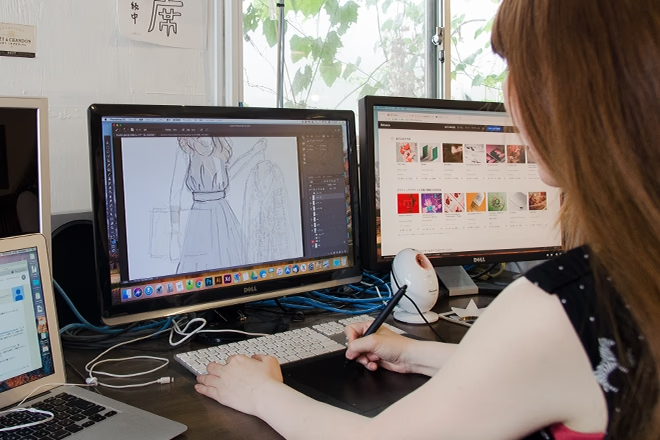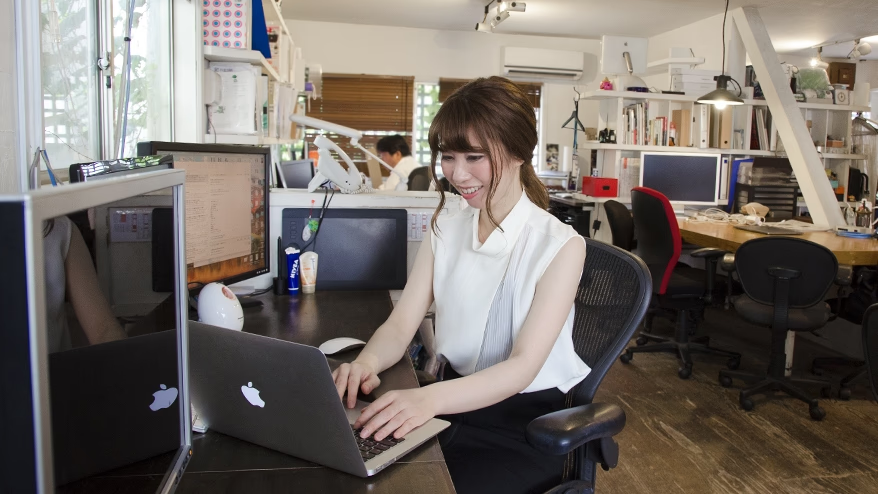こんにちは。デザイナーの滝田です。
わたしがモノサスで働きはじめたのは、2012年7月。
うちの会社ではめずらしくありませんが、デザインも Webもまったく未知の世界という完全未経験者として入社しました。
ちなみに当時は、20代後半。
新卒で入社したアパレル会社で3年目。転職経験なし。
いきなり専門職に転職だなんて不安でいっぱいになってもいいようなものですが、不安になれるほどの知識もなかったがゆえに、憧れるがままに転職してなんやかんや今年でモノサスはもうすぐ6年目。
昨年はMVPを受賞するなんてうれしい出来事もありました。
至極マイペースなわたしでも、あちこちの壁に頭をぶつけながら、なかなか楽しいデザイナー生活が送れているこのタイミングで、書いておきたいなと思ったネタがデザイナーへの転職記。
なので、今回はデザインの話はお休みします(笑)
特にこれといって大業を成し遂げたわけではないのですが、もし専門職への転職を迷っている人がいたら、ひとつの体験談として参考にしていただければうれしいです。そして願わくは、背中を押せたらいいなと思います!
デザイナーに憧れたきっかけは、「Photoshopのインターフェイスかっこいい!」
そもそもなんでデザイナーになりたいと思ったのか。
好きな Webデザイナーや衝撃を受けたグラフィックがあったとか、そんな経緯はあったかしら…と思い返してみましたが、出てこない。
それもそのはず。当時のわたしはデザイナーといえば、思いつくものはファッションデザイナーくらい。
そんな原点探しをしていたとき、記事について編集長・大村と相談していてふと思い出しました。
わたしのやってみたい仕事にデザイナーが入ってきたきっかけは、アパレルの会社で販売職から事務職に異動してからのこと。
店頭の POPや、お客さまにお送りしている DMのデザインを手がける社内のグラフィックデザイナーの存在を知ったときです。
何事も見た目から入ると定評のあるわたし。
グラフィックデザイナーの方のモニターが、なんだか華やかじゃないかと、ミーハー精神丸出しで覗き込んで、運命の出会いを果たします。
当時 Word や Excelしか扱ったことのないわたしは、モニターに映し出されている DMのデザインはそっちのけで、洗練された Photoshopのインターフェイスに釘付けでした。
「あれ(Photoshop)を使ってみたい」

もとをたどれば、そこがはじまりだったと思います。
いまになって思えば、入り口からなかなかずれていました。面接でもおそらく別の志望理由を言ったはずです(笑)
まずはスタート地点に。退職への葛藤と、職業訓練時代の過ごし方
さて、デザイナーに憧れてみたはいいものの、求人を眺めてみれば「未経験であってもデザインソフトを使いこなせる」「 Photoshop・illustrator を普通に使える」などの応募条件がずらり。(そこまで求められないところも、たまにありますが)
まずは土俵に上がるための最低ラインを認識したところで、ハローワークに足を運びます。
モノサスでは神山ものさす塾生から入社した人を含め、同じルートを通ってきた人たちがいますが、わたしも職業訓練を受けてスキルを身に着けよう、と考えたわけです。
ここで「そうと決まればさくっと前職を辞めて、秒速で面接を受けに行きました!」なんて書ければいいのですが、なかなか現実はそうではありませんでした。
即決断して行動できる人もいると思いますし、そのほうがかっこいいのですが、わたしは半年くらいはどうしたものかとぐだぐだ悩む期間がありました。
当時すごく恵まれている境遇で働いているとは思っていませんでしたが、「辞める」ということを意識しだすと急に「ちょっともったいなくない?」って(笑)
新卒から少なからず築いてきたキャリアを失うんだなとか。お給料もちょっとずつ増えてきたのにとか。年齢的なことを考えると、「20代後半だけど、専門職っていまからはじめてもなんとかなったりするもんなの?」とか。
これに対して、「こうあるべきだ!」なんて決定的な答えはわかりません。
じっくり情報収集したり、選択肢を天秤にかけて推し量っていきました。
わたしの場合は、決断の瞬間よりも決めた後どうするかのほうが100倍大事だと思っているので、最終的には「今後のわたし、頑張れ!」と未来の自分にエールを送りつつ、やりたい気持ちを押し通して退職しました。
その後、訓練校の面接を受けて、総勢40名くらい、10代後半から50代の人までと幅広い年代の同級生とともに半年間デザインソフトを学びました。
ある程度ツールが理解できてきたところで、知人のイベントのフライヤーなどの制作を手伝い始めます。
Web制作ではなかったものの、要望を聞いてデザインできる、納期に間に合わすための試行錯誤をする、制作物の反応がもらえるという点において、これがなかなかいい経験になったと思っています。
作品を作っておくことをおすすめする理由は、練習や経験といったスキルアップ面以外でもう一つあります。
就職活動のために制作することになる、ポートフォリオに掲載することができるという点でも、後々助けになります。
求人情報は日々更新されていきます。
魅力的な求人を見つけたのに、ポートフォリオが用意しきれていないなんて状況はもったいない。
わたしは履歴書すら面接直前に用意するタイプですが、作品集はそういうわけにいかないので、こつこつ貯めておくといいと思います。
未経験で戦う求人応募と面接戦争
応募に関して、わたしの場合は数打ちゃ当たると、目についた順に履歴書を送りました。
あまり雇用条件は気にせず、紙でも Webでも媒体問わず片っ端から。
なんでもいいから、とにかく第一歩を踏み出したい一心でした。
ポートフォリオもちょこちょこアップデートしつつ、20件ほどの面接を経て、いよいよモノサスの求人と出会います。
面接当日、後に上司となる先輩デザイナーが3人並んでいました。
なんとなく覚えているのは、みんな特別にこにこしていたわけじゃないけど、どこかリラックスして話せたこと。圧迫するでもなく、過剰に歓迎するわけでもなく、自然体でいろいろ質問してもらったような印象を受けました。
ここまで何件も結果的にご縁のなかったやり取りをしてきたので、この時も特別「受かった」という手応えはなかったけれど、熱意は素直に伝えられたかなといったところで面接終了。
(合否の連絡が遅れて、催促の電話をした覚えがあるので「ここの会社がいいなぁ」っていうくらいの印象はあったかと思います)
ちょっと知ってほしいなと思う、わたしの小話はここから。
モノサス入社後に上司から聞いた、わたしの採用の決め手。それは「お辞儀がきれいだったから」(笑)
販売職の研修時に、20人ほど横並びで、角度やタイミングが揃うまで何度も練習させられたお辞儀の練習風景の記憶が頭をよぎります。
さすがにすべてがお辞儀の質で決まったとは思っていませんが(そんなわけないと信じたいですが)、まったく職種に関係のないスキルでも、一生懸命身につけた技術は意外な場面で強みになったりするんだなと。
未経験の状態で戦うということは、なるほどこういう側面もあったりするのかもしれません。
一歩を踏み出して
今回は一歩を踏み出しだいけれど、なかなか踏み出せない人に向けて、デザイナーとしてモノサスで働く「別の畑からきた人間」がどんなふうに憧れを仕事にしていったのかを想像してもらえればと思い書いてみました。
もちろん何も知らない状態で飛び込んでしまえば、想像以上にわからないことだらけで勉強と挑戦の連続です。
高いモチベーションを持続させていかなければなりません。
でも入ってしまえばこっちのもの…
もとい、頑張るしかありません(笑)
冒頭でも触れましたが、改めて転職時期からの自分を振り返ってみて、いろいろな壁にぶつかって慌てたり焦ったりしつつも、やはりわたしは極端にマイペースなんだなと感じました。
6年目を目の前にしてようやく、「とにかくデザインスキルを上げたい」というざっくりした考え方から、「どんなデザイナーになりたいか」「どんな仕事をやってみたいか」という方向性を含めたスキルアップを考えるようになりました。
ここからはデザインスキルはもちろん、「やりたい仕事」「携わってみたいプロジェクト」から逆算して、必要なスキルを身につけられる方向に進んでいきたいと思っています。
わたしなりに、わりと赤裸々に綴ったつもりですがいかがでしょうか。
「実際やってみたらこんな感じなんだな」とか「いまの自分と同じような悩みだな」とか、あわよくば「とりあえず、踏み出してみようかな」と思ってもらえたら、この記事は大成功です。
いま未知の業界に憧れを持っている人、これからはじめての転職をする人が、少しでも「やれるかも」と前のめりになってもらえたら幸いです。
